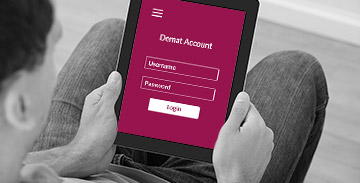If you are looking to invest and build a corpus for your various financial goals, it is a good idea to include direct equity, equity-related instruments such as Exchange Traded Funds (ETFs) and non-convertible debentures in your portfolio. For
investments, the first necessary step is opening a Demat Account.
Let us see what a Demat Account is and what are the benefits of opening
one.
What is a Demat Account?
Demat stands for ‘Dematerialised’. It dates back to the days when securities such as shares and debentures were held in the form of physical certificates. If you wanted to buy or sell a share or debenture, you needed to countersign
the certificate and deliver it to your broker. The broker would then deliver it to the buyer, who in turn would send it to the share registry to record the change of ownership. The process was long, cumbersome, unsafe and often prone to abuses
such as forgery.
In 1996, the Depository Act introduced a system of digital accounts held by SEBI registered entities called Depositories which enabled the current system of Demat Accounts. National Securities Depository and Central Depository Services Limited
are two depositories in India. These depositories issue Demat Accounts. Depository Participants (DPs), like AxisDirect, a subsidiary of Axis Bank, are entities registered with SEBI, acting as intermediaries between the depositories and investors.
Think of a Demat Account like a bank account, except instead of holding your savings it holds
your investments. Say you own 10 shares of Company X. This will show as a credit in your Demat Account. If you buy more shares of the same company, these get credited to your account. If you sell these shares, your account gets debited with
number of shares and the buyer’s Demat Account gets credited with the same number of shares.
A Demat Account thus allows investors to buy and sell securities within seconds. It’s a record keeper for all transactions, documents, and statements.
Advantages of a Demat Account:
- Demat Accounts eliminate the chances of theft or forgery since your share certificates are held online. Demat Accounts also ensure you don’t have to worry about your shares getting damaged.
- As there is no physical activity involved with the transport, storage, and registration of share certificates, it saves money and makes the process hassle-free for investors.
- Since Demat Accounts eliminate paperwork, they ease the process of buying and selling of securities.
- Demat Accounts are connected to bank accounts and trading accounts with DPs like AxisDirect. This enables digital trading of securities.
- Dividends issued by companies you have invested in, get directly credited to the bank account connected to your Demat Account. Similarly, if a company issues bonus shares they get directly credited to your Demat Account.
- Apart from shares, Demat Accounts can also be used to hold mutual fund, NCDs, tax-free bonds and insurance products.
- Since most of your financial portfolio is held in one place, it becomes very easy for you to track your financial health and gives you complete visibility over your finances.
- No more odd lots problem: Before Demat Accounts became the norm, traders had to buy or sell a specified quantity of shares -- say 1, 10 or 100 – called lots. With a Demat Account, you can trade even in a single share.
- No hassle in share transfer: Before Demat Accounts, the wait to transfer shares would run into multiple months. Today it takes no time to do this. Plus you save money on stamp duty.
With AxisDirect you can open a Demat Account with a savings account from any bank. To know more about the services and offers from AxisDirect or to open a Demat Account,
click here.
Disclaimer: This article has been authored by The Source, a Mumbai-based content creation and curation firm. Axis Bank does not influence views of the author in any way. Axis Bank and The Source shall not be responsible for any direct / indirect loss or liability incurred by the reader for taking any financial decisions based on the contents and information. Please consult your financial advisor before making any financial decision.








